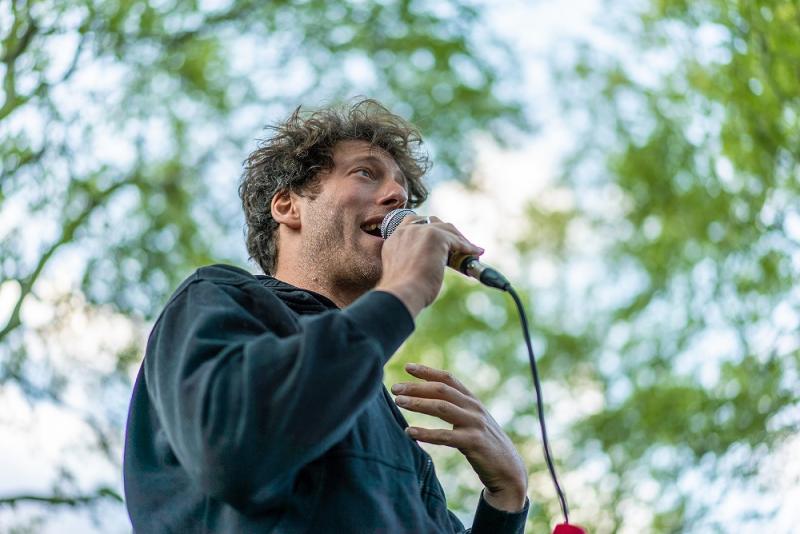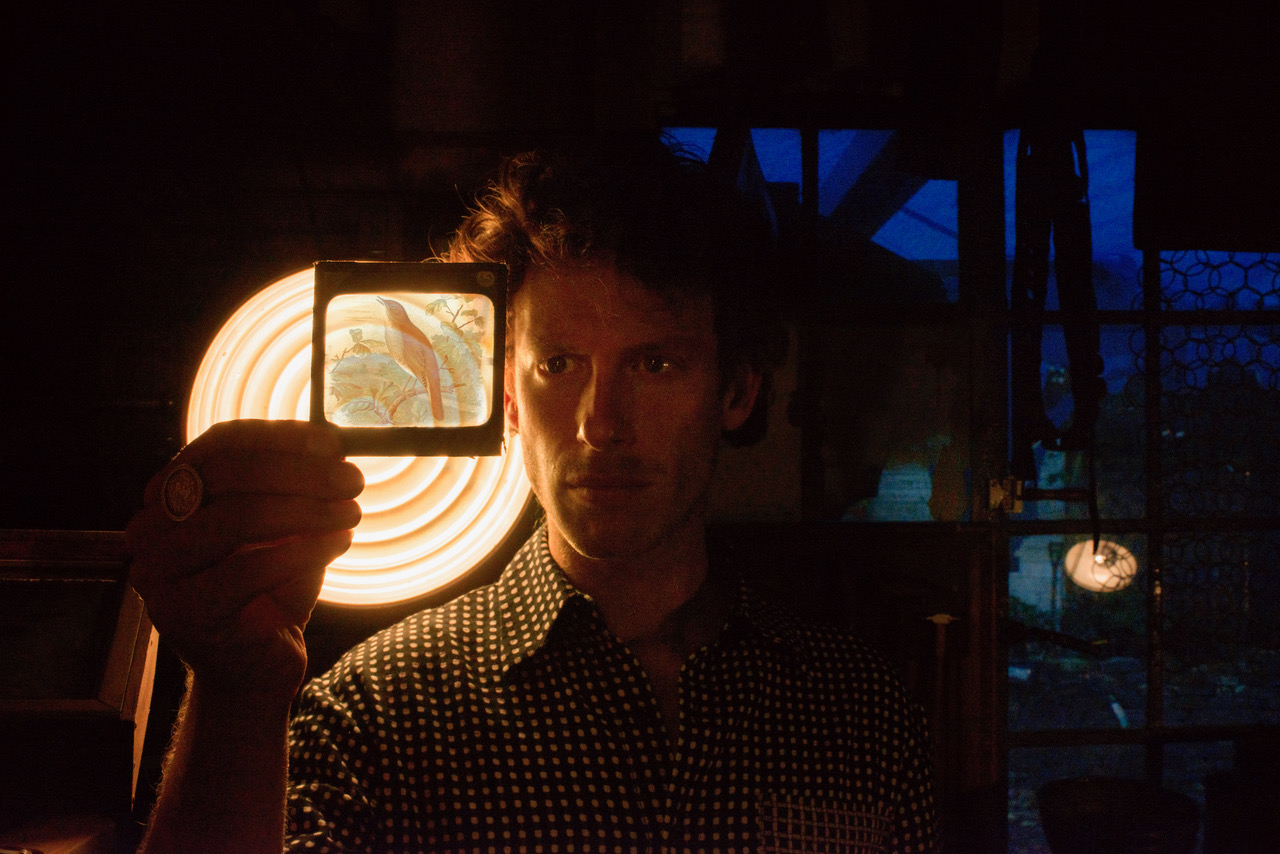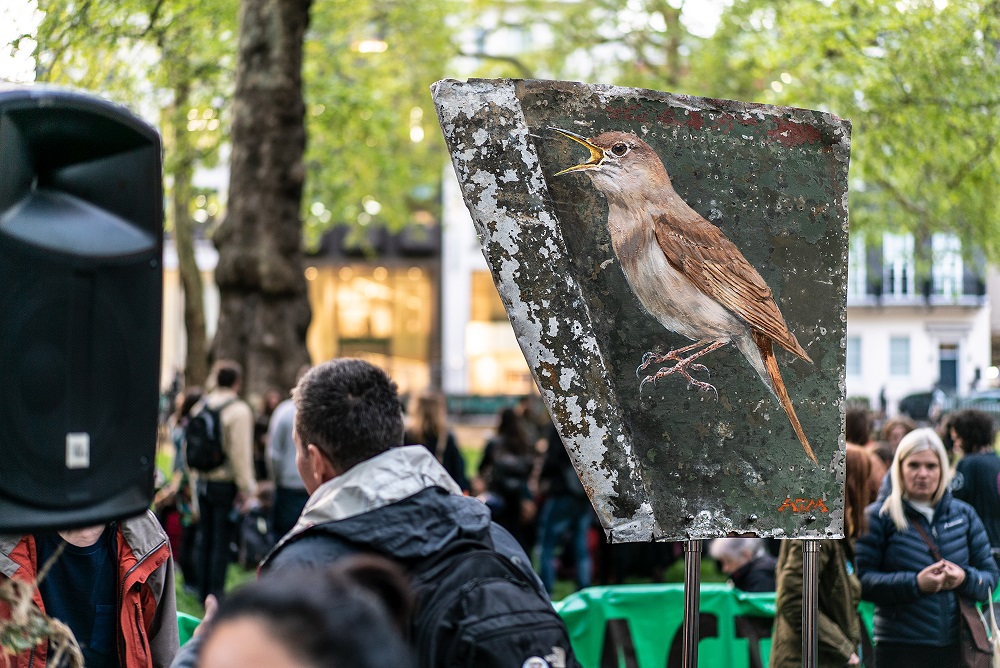First Person: Sam Lee on singing with endangered nightingales | reviews, news & interviews
First Person: Sam Lee on singing with endangered nightingales
First Person: Sam Lee on singing with endangered nightingales
The folk singer on streaming for Extinction Rebellion and the Absolute Bird series

Every spring for the last five years, we have gathered around a camp fire in hidden locations in a wood in Sussex, to join the nightingales and to “re-wild” ancient folk ballads. We walk in silence through the forest at night, with no torches, reawakening our aural senses. These meditative pilgrimages give people permission to be in a state of communion with nature, to be silent to hear the birds.
Nightingales show many human-like qualities in their social interactions, their calls and responses. They have 200 phrases which they are constantly improvising, repeating and adapting. Hearing us singing folk ballads, they acknowledge our presence just 10 metres away and change their rhythm, pitch, and frequency. Embedded in what we do in these events is the “broadcasting” of sonic heirloom seeds in an attempt to restore and reinvigorate that ancient and intuitive coexistence with which our known (and long since forgotten) folk songs and the patterns of nature have evolved. The reason is simple. We are nature. And we need nature as much as it needs us. These songs of and about the land are declarations of our dependency on this earth.
The context in which we have grown accustomed to hearing music nowadays denies us so much sensation that for millennia has been the forge in which our music, our language and our stories have evolved. By taking song back to its source an indescribable act of restoration occurs both inward and outward. These songs reclaim meaning and help heal and enhance our often-complicated relationship with the land. The payoff is an enhanced sense of duty to care harder and deeper. Folk song, like nature, is in the participation - we do it through our feet, our voices and our hearts.  Birdsong has been one of the biggest influences on British song, poetry and literature. It has contributed to an extraordinary aural history which composers have been mining for 800 years – whether Vaughan Williams with his famous The Lark Ascending or Messiaen, Vivaldi, Respighi or more recently Hollis Taylor.
Birdsong has been one of the biggest influences on British song, poetry and literature. It has contributed to an extraordinary aural history which composers have been mining for 800 years – whether Vaughan Williams with his famous The Lark Ascending or Messiaen, Vivaldi, Respighi or more recently Hollis Taylor.
From tonight through to 24 May, the City of London Sinfonia’s Absolute Bird series is celebrating spring in concerts with 800 years of music at the Southbank and Southwark Cathedral. RSPB’s President Miranda Krestovnikoff, who is also a talented flautist, joins CLS in Southwark Cathedral for an interactive experience. And on the last night, I’ll be there at the Southbank, as we set up a microphone in the forest to live-stream the nightingales directly into the concert hall and tune into their pulse.
Last September, the RSPB approached me about releasing a single of pure birdsong. They had heard about The Nest Collective’s Singing with Nightingales – and wanted to see whether we could create a track to break into the charts. Assembling the calls of 25 bird varieties into a single track, the RSPB wants to draw attention to the loss of 40 million wild birds from our isles over the last half a century. The loss of 90% of nightingales from our skies over the last 50 years means there are now only 5,000 of the endangered species left. We might lose them completely in the next 30 years. It's a similar situation for turtle doves, skylarks, swifts, curlews, and many more.
Our track - Let Nature Sing - was released last Friday in time for International Dawn Chorus Day on Sunday. Though it is an act of celebration of our native birds, the single is also a lament and wake-up call to natures’ crisis. It has already broken in the charts – hovering at 11 in the middle of this week. Can we hope it reaches No.1?  A couple of centuries ago, we mapped our seasons through birdsong. The loss of birdcalls should concern all of us, because it is a signal that all is not well in the world. We should see birdsong as a barometer for the health of the planet and of ourselves. On Monday evening as a culmination of the last fortnight’s Extinction Rebellion across London, The Nest Collective brought the nightingale's sonic wonderment into Berkeley Square, with the song it is most famous for (the gathering pictured above). Through synchronised streaming of the nightingale’s mesmeric, yet seldom heard, courtship song via mobile phones and mobile speakers, our pop-up action filled the garden and surrounding streets with the song of a creature nearing extinction on this island.
A couple of centuries ago, we mapped our seasons through birdsong. The loss of birdcalls should concern all of us, because it is a signal that all is not well in the world. We should see birdsong as a barometer for the health of the planet and of ourselves. On Monday evening as a culmination of the last fortnight’s Extinction Rebellion across London, The Nest Collective brought the nightingale's sonic wonderment into Berkeley Square, with the song it is most famous for (the gathering pictured above). Through synchronised streaming of the nightingale’s mesmeric, yet seldom heard, courtship song via mobile phones and mobile speakers, our pop-up action filled the garden and surrounding streets with the song of a creature nearing extinction on this island.
In the midst of the heightened attention to climate change and environmental catastrophe we want to bring people together in celebration of the musical beauty of the natural world. This central London "re-wilding" action aims to bring poetic focus to the shocking demise of our own native species and to give Londoners the opportunity to hear a once ubiquitous songbird, now nearly extinct in the UK, in its mythic notional home.
Explore topics
Share this article
The future of Arts Journalism
You can stop theartsdesk.com closing!
We urgently need financing to survive. Our fundraising drive has thus far raised £49,000 but we need to reach £100,000 or we will be forced to close. Please contribute here: https://gofund.me/c3f6033d
And if you can forward this information to anyone who might assist, we’d be grateful.

Subscribe to theartsdesk.com
Thank you for continuing to read our work on theartsdesk.com. For unlimited access to every article in its entirety, including our archive of more than 15,000 pieces, we're asking for £5 per month or £40 per year. We feel it's a very good deal, and hope you do too.
To take a subscription now simply click here.
And if you're looking for that extra gift for a friend or family member, why not treat them to a theartsdesk.com gift subscription?
more New music
 Music Reissues Weekly: Joe Meek - A Curious Mind
How the maverick Sixties producer’s preoccupations influenced his creations
Music Reissues Weekly: Joe Meek - A Curious Mind
How the maverick Sixties producer’s preoccupations influenced his creations
 Pop Will Eat Itself, O2 Institute, Birmingham review - Poppies are back on patrol
PWEI hit home turf and blow the place up
Pop Will Eat Itself, O2 Institute, Birmingham review - Poppies are back on patrol
PWEI hit home turf and blow the place up
 'Fevereaten' sees gothic punk-metallers Witch Fever revel in atmospheric paganist raging
Second album from heavy-riffing quartet expands sonically on their debut
'Fevereaten' sees gothic punk-metallers Witch Fever revel in atmospheric paganist raging
Second album from heavy-riffing quartet expands sonically on their debut
 theartsdesk Q&A: Soft Cell
Upon the untimely passing of Dave Ball we revisit our September 2018 Soft Cell interview
theartsdesk Q&A: Soft Cell
Upon the untimely passing of Dave Ball we revisit our September 2018 Soft Cell interview
 Demi Lovato's ninth album, 'It's Not That Deep', goes for a frolic on the dancefloor
US pop icon's latest is full of unpretentious pop-club bangers
Demi Lovato's ninth album, 'It's Not That Deep', goes for a frolic on the dancefloor
US pop icon's latest is full of unpretentious pop-club bangers
 Yazmin Lacey confirms her place in a vital soul movement with 'Teal Dreams'
Intimacy and rich poetry on UK soul star's second LP
Yazmin Lacey confirms her place in a vital soul movement with 'Teal Dreams'
Intimacy and rich poetry on UK soul star's second LP
 Solar Eyes, Hare & Hounds, Birmingham review - local lads lay down some new tunes for a home crowd
Psychedelic indie dance music marinated in swirling dry ice
Solar Eyes, Hare & Hounds, Birmingham review - local lads lay down some new tunes for a home crowd
Psychedelic indie dance music marinated in swirling dry ice
 The Lemonheads' 'Love Chant' is a fine return to form
Evan Dando finally gets back in the saddle with an album of new tunes
The Lemonheads' 'Love Chant' is a fine return to form
Evan Dando finally gets back in the saddle with an album of new tunes
 Music Reissues Weekly: Evie Sands - I Can’t Let Go
Diligent, treasure-packed tribute to one of Sixties’ America’s great vocal stylists
Music Reissues Weekly: Evie Sands - I Can’t Let Go
Diligent, treasure-packed tribute to one of Sixties’ America’s great vocal stylists
 'Deadbeat': Tame Impala's downbeat rave-inspired latest
Fifth album from Australian project grooves but falls flat
'Deadbeat': Tame Impala's downbeat rave-inspired latest
Fifth album from Australian project grooves but falls flat
 Heartbreak and soaring beauty on Chrissie Hynde & Pals' Duets Special
The great Pretender at her most romantic and on the form of her life
Heartbreak and soaring beauty on Chrissie Hynde & Pals' Duets Special
The great Pretender at her most romantic and on the form of her life
 The Last Dinner Party's 'From the Pyre' is as enjoyable as it is over-the-top
Musically sophisticated five-piece ramp up the excesses but remain contagiously pop
The Last Dinner Party's 'From the Pyre' is as enjoyable as it is over-the-top
Musically sophisticated five-piece ramp up the excesses but remain contagiously pop

Add comment